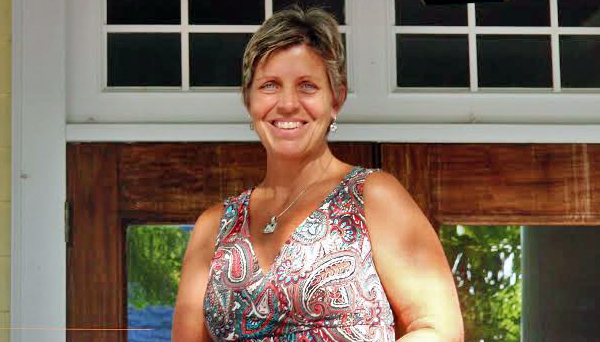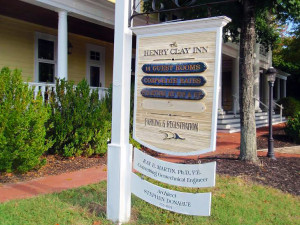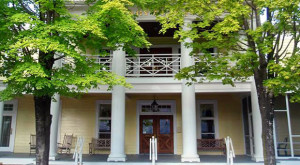
Ann-Carol Houston manages the Henry Clay Inn, which will be auctioned in mid-October. Photos by Brandy Brubaker.
The owners of an Ashland Inn are ready to check out.
The Henry Clay Inn at 114 N. Railroad Ave. will be sold at an auction next month that will write the next chapter of a story that spans three centuries and three incarnations.
The inn, named for the Hanover County-born 19th-century politician, is owned by Ray and Carol Martin and managed by their daughter, Ann-Carol Houston.
Houston said her parents, who are in their early 70s, are ready to sell the inn and enjoy retirement.
Although its Georgian design looks authentic, the current Henry Clay Inn is a historic reproduction built in the early 1990s.
“Most people come in and say, ‘Gosh, how old is it?’ and we say we built it in 1991, and they can’t believe it,” Houston said.

The historic-looking inn was built in the early ’90s, a replica of the earlier structure that was destroyed in a fire.
The original inn, called the Ashland Hotel, was built in 1858 not far from the current structure and served city folk weekending in the country and tourists visiting the one-time hot springs resort, according to the auction listing. It closed briefly during the Civil War, and a fire destroyed the building in 1905.
It was rebuilt and reopened a year later as the Henry Clay Hotel. In 1946, the inn burned to the ground again. At the time, nearby Randolph-Macon College owned the inn and had hoped to convert it to a dining hall for students, the listing said.
The inn’s story could’ve ended there – if Ray Martin hadn’t heard about it.
A 1970s Ashland transplant, Martin, an engineer by trade, convinced his wife that they should rebuild the town landmark. In 1991, they bought a lot on Railroad Avenue and gave the inn a third life.
“They thought what a nice thing it would be for the town to have the inn back,” Houston said. “It was such a part of its past.”
Her father researched the inn’s history and found old photos and sketches of how it once looked.
“We didn’t have the plans, but it basically looks the same,” Houston said. “There were some adjustments we had to make because of (county building) code.”
The Martins had a deal in the works to sell the inn to Randolph-Macon College for use as an honors dormitory and office space, until city officials denied the permit necessary for the sale, Houston said.

The inn’s namesake Henry Clay served as secretary of state under President John Quincy Adams and was three-time speaker of the House. He was born in 1777 on a Hanover County homestead.
After that plan fell through, the family re-evaluated the situation and decided to give the auction block a try.
Auction firm Tranzon has been hired to handle the sale, which will take place at 2 p.m. on Oct. 16. The 12,000-square-foot structure was most recently appraised at $1.1 million, according to Tranzon.
The inn has 13 guest rooms and rents other space to a few local businesses. At one time, it also operated a restaurant but closed it in 2008.
Houston and her family plan to host their last guests at the inn Thanksgiving weekend. A new owner could continue the property’s tradition of hospitality, but Houston sees other uses like office space, condos or a restaurant.
“We would love to see somebody run it as an inn, but there are so many things you could do with it,” she said.
If the inn doesn’t sell at auction, it will be listed for traditional sale. In that scenario, Houston said they’ll rethink whether to close the inn or keep it open until a buyer is found.

Ann-Carol Houston manages the Henry Clay Inn, which will be auctioned in mid-October. Photos by Brandy Brubaker.
The owners of an Ashland Inn are ready to check out.
The Henry Clay Inn at 114 N. Railroad Ave. will be sold at an auction next month that will write the next chapter of a story that spans three centuries and three incarnations.
The inn, named for the Hanover County-born 19th-century politician, is owned by Ray and Carol Martin and managed by their daughter, Ann-Carol Houston.
Houston said her parents, who are in their early 70s, are ready to sell the inn and enjoy retirement.
Although its Georgian design looks authentic, the current Henry Clay Inn is a historic reproduction built in the early 1990s.
“Most people come in and say, ‘Gosh, how old is it?’ and we say we built it in 1991, and they can’t believe it,” Houston said.

The historic-looking inn was built in the early ’90s, a replica of the earlier structure that was destroyed in a fire.
The original inn, called the Ashland Hotel, was built in 1858 not far from the current structure and served city folk weekending in the country and tourists visiting the one-time hot springs resort, according to the auction listing. It closed briefly during the Civil War, and a fire destroyed the building in 1905.
It was rebuilt and reopened a year later as the Henry Clay Hotel. In 1946, the inn burned to the ground again. At the time, nearby Randolph-Macon College owned the inn and had hoped to convert it to a dining hall for students, the listing said.
The inn’s story could’ve ended there – if Ray Martin hadn’t heard about it.
A 1970s Ashland transplant, Martin, an engineer by trade, convinced his wife that they should rebuild the town landmark. In 1991, they bought a lot on Railroad Avenue and gave the inn a third life.
“They thought what a nice thing it would be for the town to have the inn back,” Houston said. “It was such a part of its past.”
Her father researched the inn’s history and found old photos and sketches of how it once looked.
“We didn’t have the plans, but it basically looks the same,” Houston said. “There were some adjustments we had to make because of (county building) code.”
The Martins had a deal in the works to sell the inn to Randolph-Macon College for use as an honors dormitory and office space, until city officials denied the permit necessary for the sale, Houston said.

The inn’s namesake Henry Clay served as secretary of state under President John Quincy Adams and was three-time speaker of the House. He was born in 1777 on a Hanover County homestead.
After that plan fell through, the family re-evaluated the situation and decided to give the auction block a try.
Auction firm Tranzon has been hired to handle the sale, which will take place at 2 p.m. on Oct. 16. The 12,000-square-foot structure was most recently appraised at $1.1 million, according to Tranzon.
The inn has 13 guest rooms and rents other space to a few local businesses. At one time, it also operated a restaurant but closed it in 2008.
Houston and her family plan to host their last guests at the inn Thanksgiving weekend. A new owner could continue the property’s tradition of hospitality, but Houston sees other uses like office space, condos or a restaurant.
“We would love to see somebody run it as an inn, but there are so many things you could do with it,” she said.
If the inn doesn’t sell at auction, it will be listed for traditional sale. In that scenario, Houston said they’ll rethink whether to close the inn or keep it open until a buyer is found.


